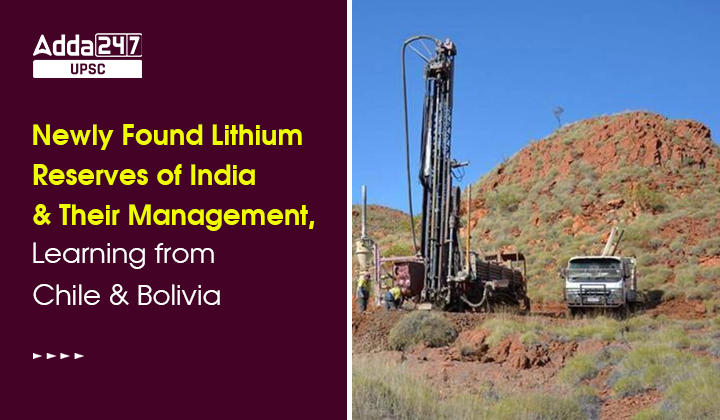Table of Contents
Lithium Reserves of India: Lithium is primarily used in rechargeable lithium-ion batteries, which power portable electronic devices, electric vehicles, and energy storage systems. Lithium Reserves of India topic is important for UPSC Prelims Exam and UPSC Mains Exam (GS Paper 1- Distribution of resources across various geographies).
Lithium Reserves of India in News
The discovery of substantial lithium reserves in Jammu and Kashmir, crucial for the production of batteries used in electric vehicles and renewable energy infrastructure, has garnered widespread appreciation. The news has been hailed as a positive development for national prosperity and security, while acknowledging the need to address concerns regarding potential social and environmental consequences.
Status of India’s Lithium Industry
The Indian electric vehicle (EV) market, valued at $383.5 million in 2021, is projected to reach $152.21 billion by 2030.
- In 2019-2020, India imported 450 million units of lithium batteries worth $929.26 million (₹6,600 crore), underscoring the significance of developing domestic lithium reserves.
- Experts argue that the global shift towards low-carbon economies, rapid advancements in artificial intelligence (AI), and the expansion of 5G networks will profoundly reshape global and regional geopolitics.
- The access to and control over rare minerals like lithium and cobalt will play a pivotal role in these transformative changes.
Management of Lithium Resources in India
In July 2013, the Supreme Court of India, in a ruling by a three-judge bench, affirmed that the owner of land possesses rights to everything below it, extending “down to the center of the earth.”
- However, it is noteworthy that substantial portions of land in India, including forests (which constitute over 22% of the country’s landmass), hills, mountains, and revenue wastelands, are publicly owned.
- The Supreme Court also highlighted that the Union government has the authority to prohibit private entities from mining sensitive minerals, similar to the existing ban on uranium mining under the Atomic Energy Act of 1962.
- In the present context, the importance of lithium is comparable to, if not greater than, uranium.
Lithium Resource Management by Other Countries
The stories of two South American countries, Chile and Bolivia — which have the largest known reserves of lithium — are particularly instructive.
Lithium Material Management in Chile
In Chile, the government has declared lithium a strategic resource, granting exclusive state control over its development. Only two companies, SQM and Albemarle, are licensed to produce lithium in the country.
- In April 2023, Chile’s President Gabriel Boric announced a “National Lithium Strategy,” initially interpreted by some in the corporate sector as a potential nationalization of the industry.
- However, President Boric clarified that his government would respect existing contracts.
- The strategy aims to foster public-private partnerships for future lithium projects, enabling the state to regulate the environmental impact of lithium mining, ensure fair distribution of revenue to local communities, and promote domestic research in lithium-based green technologies.
Lithium Material Management in Bolivia
Bolivia, under the leadership of former President Evo Morales, introduced a new constitution approved by popular vote in February 2009, granting the state full control and direction over the exploration, exploitation, industrialization, transportation, and commercialization of natural resources.
- Morales’ administration nationalized lithium and maintained a firm stance against private and foreign involvement.
- However, this approach is considered one of the reasons Bolivia has not yet achieved commercial-scale lithium production, even after nearly 20 years of industry nationalization.
- Bolivia’s current President, Luis Arce, aims to change this. Instead of handing over lithium resources to the private sector, President Arce intends to collaborate with other Latin American nations to design a ‘lithium policy’ that benefits the economies of all involved countries.
Across Latin and South America, countries are formulating comprehensive approaches to navigate their lithium strategies. While national governments in the region maintain substantial control, the level of private sector involvement varies among these countries. The decisions made by these governments are also influenced by the demands of Indigenous Peoples in the region, who advocate for greater accountability from both corporations and governments.
Way Forward
As India embarks on exploring and developing its domestic lithium reserves, it is crucial to acknowledge that the responsible and efficient management of this sector will be of utmost importance. Many of India’s mineral-rich regions suffer from pervasive poverty, environmental degradation, and lax regulatory frameworks. To ensure that the development of rare minerals aligns with multiple objectives such as social welfare, environmental sustainability, and national energy security, the Indian government must prioritize effective and diligent governance of the sector.
Significance Of Huge Lithium Reserves In Jammu And Kashmir
| Follow US |
| UPSC Govt Jobs UPSC Current Affairs UPSC Judiciary PCS Download Adda 247 App here to get the latest updates |



 TSPSC Group 1 Question Paper 2024, Downl...
TSPSC Group 1 Question Paper 2024, Downl...
 TSPSC Group 1 Answer key 2024 Out, Downl...
TSPSC Group 1 Answer key 2024 Out, Downl...
 UPSC Prelims 2024 Question Paper, Downlo...
UPSC Prelims 2024 Question Paper, Downlo...




